Andrew Scott, Dakota Fanning, Johnny Flynn talk about filming psychological thriller 'Ripley'
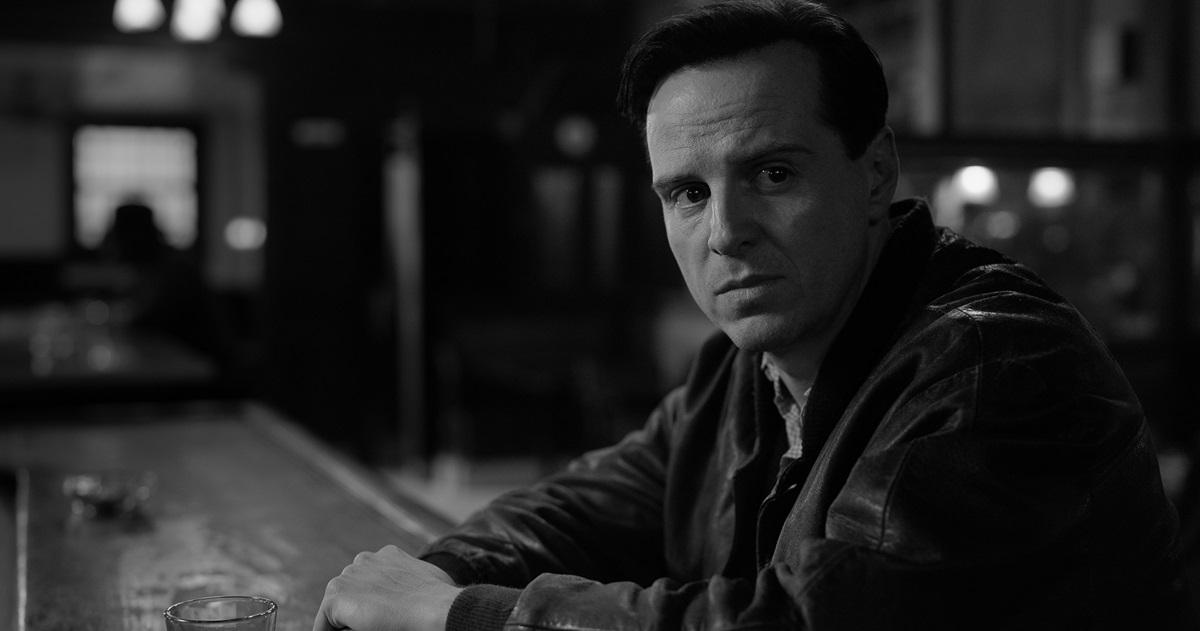
You may have seen several film adaptations of the classic Patricia Highsmith's original 1955 novel, "The Talented Mr. Ripley." But Steven Zaillian's created-written-and-directed latest version, "Ripley," starring Andrew Scott as Tom Ripley in dramatic black and white color is definitely something to look forward to.
Zaillian, who has done "Schindler's List," "Awakenings," "Gangs of New York," "Moneyball" and "The Irishman," makes it look very inspired, according to "The Verge."
"The Verge" wrote, "If you know the classic Ripley story, the trailer's artful, black-and-white shots of Tom altering a passport, greeting Italian detectives at his door, and standing up on a small boat in the middle of the ocean will all speak volumes about the many twists and turns the show's going to take. What the trailer leaves you to guess, though, is whether Scott's Ripley is always going to give off that very obvious 'I'm not to be trusted' vibe for the whole season, or if he's actually going to turn on the charm at some point when Ripley debuts on April 4th (in Netflix)."
We were able to exclusively interview Andrew Scott, Johnny Flynn and Dakota Fanning via Zoom. We also talked to them virtually in a press conference setting with director Zaillian and actor Maurizio Lombardi who ably portrayed the cool Inspector Pietro Ravini. Below are excerpts of our conversations with them as they talked about the making of this psychological thriller TV series which was filmed in Italy.
Andrew Scott (Tom Ripley)
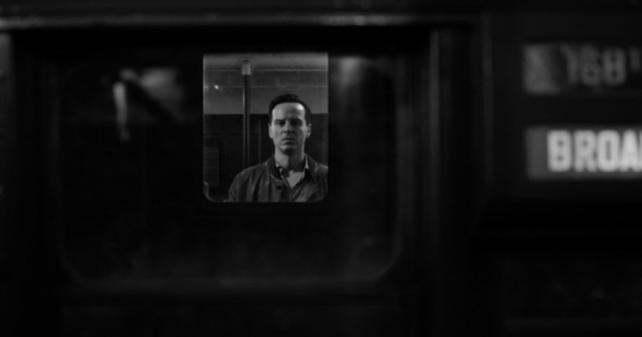
How challenging was it to get into the skin and mind of Tom Ripley?
It was very challenging. It was a great honor and a privilege, but it was certainly challenging. He's a very complex character and requires a little bit of thinking about how I'd go about it because he's so multifaceted and he's so alluring for so many people as a literary character, but also as a screen character. So, I had to think about how I could add to the proceedings and not take away from them. But I adored the character. I still do. I have great affection for Tom.
Yeah, I'm not a method actor. But I did find it challenging, because, ideologically, we're different, even though you do have to find a kind of commonality with the characters you play. I've only murdered four people.
I loved the character. It's really interesting, when you're filming for something for the guts of a year, the kind of murderous stuff only takes a little while. And a lot of the scenes are quite domestic and very actable scenes, where you're talking about unrequited love or just loneliness. The difficulty, for me, is the stamina that was required, physical stamina, because there was a huge amount of action, so to speak. I say somewhat shamefacedly, but it was. This action was physical. But also, just the fact that he's in 95 percent of the scenes in an eight-hour show, that's an awful lot of acting, and you're on there all the time to perform, every day, for a year, with no breaks.
A lot of the time, in, like, television series, it's about a family or a hospital or a couple, even, or a police department, or whatever. And this is unusual in the sense I think we might see it a little bit in movies, where one character's there the whole time, but, in a limited series, where it's just one person a lot of the time, I think it's kind of unusual. And I've taken great refuge in the fact that Johnny and Dakota were there, and, oh, I missed them when they weren't.
So, psychologically, I find that I'm playing a very solitary, not necessarily lonely, character, but certainly a solitary one. Or being away from home, and the language, that was a big, dark place to be. A huge privilege, too, but certainly a challenge.
Did you prepare for the physicality of this role going up and down the stairs in Italy?
The stairs sure are something, it was very physical. There's a sequence in one of the episodes where there's a whole boat, sea battle, rock lifting, and throwing. There's a lot of action. It was a huge, huge action sequence. And so that was definitely a lot. And then it happens again later on in the show. So, the stairs were nothing compared to that. But, as anyone who goes to the beautiful country of Italy, stairs are certainly part of the experience.
How was it working with John Malkovich who portrays Reeves Minot?
Oh, wonderful. He's such an exciting presence and such an interesting man. We shot together for a few days, and it was wonderful. He was very generous because, of course, he's played Tom Ripley himself. And he had the manners and the good grace not to sigh when I was acting.
How difficult was it to forget about Matt Damon who also portrayed Tom Ripley in "The Talented Mr. Ripley" (1999) and make the character your own? Did you take any inspiration from the previous onscreen adaptations of him?
Obviously, that's a film that people love and I'm one of the people that love that film and love the performances in the film. So, it was a concern when you hear about a project like this, is that going to be a remake in some way? Or what's the point in aping someone else's already successful work? And right from the beginning, I knew that was completely the opposite intention of Steve Zaillian, our writer-director.
There's been a few iterations of the story over the years, but Steve has had a very particular vision for the story right from when he read it many, many years ago. And I think the opportunity to write it and to tell the story on long-form television was a really interesting dynamic for him. He had a very strong vision that he wanted it to be in black and white. And I think the idea that black and white can be married in some way to the way he wanted to teach the audience how to watch this story in a very particular way was very similar to the way we might read a novel.
We don't read a novel in two hours or two and a half hours. We read it over a certain amount of time. So, within the story, we can focus sometimes exclusively on a very particular aspect of the story, a little corner piece of the story. And then sometimes it's about the plot and sometimes about the characters. And I think that's enormously engaging for the audience.
I think we get to spend some time with the characters, and we get to watch this man think and make mistakes. I think with very famous characters, literary characters, you sometimes have it with Shakespearean characters or very famous characters that people have real possession of, and rightly so, that you can be very overly concerned with the famousness of the character or what the sort of buzzword for the character might be, psychopath or sociopath or you know, serial killer and all those things.
None of those things are of any interest to me. I don't think Tom is a natural-born killer. I think he's somebody who's very fallible and makes mistakes, and we see those mistakes happen in real-time, and we also see his real talent taking place as well. All those things were available to me, and so as soon as I spoke with Steve, any concerns on that level were put aside. For people watching it, I think those concerns immediately go when they see this sort of unique singular take on the story.
I'm not sure how the psychiatric community would categorize Tom Ripley, but the term sociopath might be close to the top. How intrigued did you become about this character and what kind of deep dive did you do? And have you ever encountered a Ripley in your own life?
I was very reluctant to diagnose the character with anything too specific. I think the reason that the character is so enduring and so iconic is that we have so many questions about him.
And so, to answer too many of them in too specific a way reduces the character. The reason that we find people fascinating, scary, terrifying or uncomfortable is that we don't have too much information about them. So, I always feel like the information that Tom gives off about himself is not necessarily reliable. It's a little bit like holding water. You need to get a sense of that without diagnosing his nationality or even his age or his sexuality, that you have a thing where you can't quite catch that.
It's very interesting, a lot of people ask, have you ever encountered a Tom Ripley? But I think that the reason the character is so enduring is that it's not about encountering Tom Ripley and othering him, but actually saying what part of Tom Ripley is within us. That's why I think the character and the achievement of Patricia Highsmith's novel and creating this character is that we root for this person who's doing these bad things.
Because I think what she's talking about is about a man who's ignored by society, who's incredibly gifted. He's a con artist, he's nevertheless an artist, and he has to survive, and make his living fraudulently. He's ignored and he doesn't have access to any of the beautiful things that some of the other characters in the story do, namely arts and music and beauty. When you ignore those people and they're suddenly exposed to it, I think they become aware of the rage that they have within them.
For some, it's a very light message within the story, but it's certainly a message which everybody deserves of beauty and art in the world. It's not for a certain section of the community. It's not just for the rich. And talented people are all over the world in developed countries and developing countries. And we just have to give them -- we have to understand that it's about class, money, morality and fairness.
Could you talk about the stunning, beautiful, black-and-white cinematography by Robert Elswit and how it helped to set the mood and enhance the story's period setting?
I feel like the black and white doesn't work alone. I feel like it's in a marriage with the way we're taught to watch the show. The black and white visuals really matched the tone and the pacing of the show because we're taught how to watch it. We're invited to be mesmerized by the way the story unfolds in the same way that we are in a novel. So, to me, it's very of the period. Steve said something interesting, which is that, of course, if Patricia Highsmith was writing at the time, and she was thinking about it as a film, she would be thinking about it in black and white, in that sense, and I think that's a very interesting way to look at it.
I love the idea that novels can have different interpretations, like this one has. And Steve, he read the novel, and it had a black-and-white cover on it, and I love the fact that that can ignite something completely different in different filmmakers. For Steve, he saw it very singularly, and he is one of our most extraordinary writers.
And he wrote these extraordinary scripts that are both incredibly classic and also wonderfully modern and inventive. I love the fact that another artist can ignite the imagination of another artist, and I hope our series can ignite the imagination of artists who might watch this too.
You've played a variety of characters during your career, from Fleabag's hot priest to James Bond, "Spectre", "All Of Us Strangers", and now, as Tom Ripley. Is it more interesting to play a villain?
I don't see Tom as a villain. I know other people have every right to call him a villain, but I think he's so complex, and I think it's too easy for us to call him just a villain. I certainly think he's an anti-hero. The question I really believe is what I think the great achievement of the stories, and this version of the script is that we are rooting for somebody that we shouldn't necessarily root for. We want him to get away with it, for the most part. We question him, and that can only be because we see ourselves in Tom Ripley.
The idea was to make the audience feel what it's like to be Tom Ripley, not to be a victim of Tom Ripley. Because we all have darkness within us, and we're a mystery to ourselves, in many ways. We're not all necessarily murderous, but I think there is a darkness, and there are questions we have about ourselves, and that we remain a mystery to ourselves, and we don't find the answers to.
It's very interesting talking about the character, because, of all the characters that I've spoken about, this is the one that people want answers for. They want, "What's his sexuality? Where is he from? Is that true, the thing?" And I love that, because, in some ways, those questions are quite naive because that's the whole point, is that we're not going to know. We're not going to get the answer to the why, but it does make us ask the questions, and I think that's a sign of really good art.
Johnny Flynn (Dickie Greenleaf)
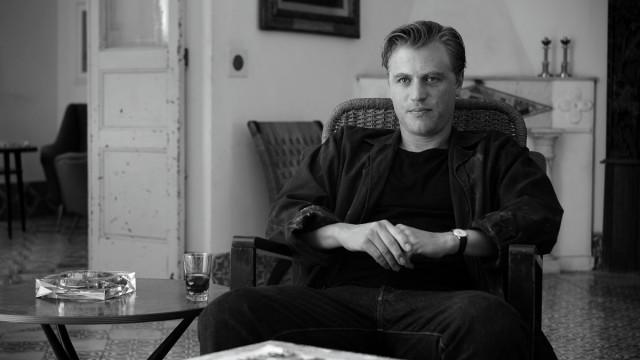
A long time ago I saw the (Anthony) Minghella (1999) film. And I had seen the John Malkovich (2003) film, but yeah, a long time ago. We weren't really interested in - it wasn't helpful to revisit those interpretations. But what was good was to go back to the novel, which I hadn't read and which was the impetus for this version because Steven Zaillian remembered exactly how he felt when he read it and he's spoken about the tone of it. And with long-form TV you have the chance maybe to be truer to the nuance of a novel. To be living with the story for that length of time you can slow down the pace and be in these characters' minds. And so that was nice, just to think of the book and not be worried about anyone else's portrayal of the characters.
What was your most memorable experience in Italy?
We ate a lot of good food. Which was dangerous, really. There was a scene quite late on in the shoot where we all had to be on the beach and poor Andrew was in a pair of Speedos that we were like - it was very tempting to just be eating pasta and pizza every day. But it was a joy to be there with the Italian people and the Italian crew who were so wonderful. And so, yeah, I love that side of it.
What were your conversations with Steven Zaillian about Dickie and who he is? It feels like Johnny is sort of the antithesis of Tom's character.
Steve just kept saying he's a nice guy, you know. I just remember him saying that a lot. I think the novel and our version of it are very much from Tom's perspective. And that's the beauty of her writing -- you get onto a level with his thinking, which is a huge achievement.
You slowly get into his logic and why you start to feel for him and you empathize with him. And there's not a lot that is there to really explain what Dickie is about. But he's somebody that Tom sees and a life that Tom sees. And you know, the way I tried to do it was really in finding the reasons to be intrigued by this person that comes into our lives.
There was such a natural connection with Andrew, and I just saw him as a good guy who was a little lost. And this person comes into their lives who he finds intriguing and there's a connection and is also somebody who he can teach about the way he sees the world. It's rewarding for him that this person loves the world, that he sees the ideals for beauty that he holds, and that he's so excited by that. And so it's a sweetness in him that I wanted to come out.
Could you talk about the stunning, beautiful, black-and-white cinematography by Robert Elswit and how it helped to set the mood and enhance the story's period setting?
Obviously, we weren't living our lives in black and white when we were making it, but the fact that we knew that that was the intention was exciting.
And watching films from the period, thinking about Fellini and the films that were being made in the period that the book is set, was a wonderful atmospheric reference. The colors and the clothes were very muted. Steve's idea, which is true in the book, as opposed to other versions of the story, was that none of the warmth of Italy that we know about is represented. It's kind of out of season. They're the only people on the beach when Tom finds them, and I love the framing of that. We were there, like, in these incredibly beautiful places that people go on holiday as the seasons changed, and the only people left were the local fishermen.
So, yeah, in terms of the atmosphere that we felt, there's a darkness, especially on the Amalfi Coast. Because it's incredibly beautiful. Crumbling villages right on the sea, and then there are mountains, so there's huge shadows, and there's these strange, kind of, caverns and stairways. All of that is what makes the atmosphere of the story have that Gothic noir quality that's very beautiful, but also quite eerie. Tonally, with the black and white, watching it, for me, it all works, with the music, as well. It's really powerful.
Dakota Fanning (Marge Sherwood)
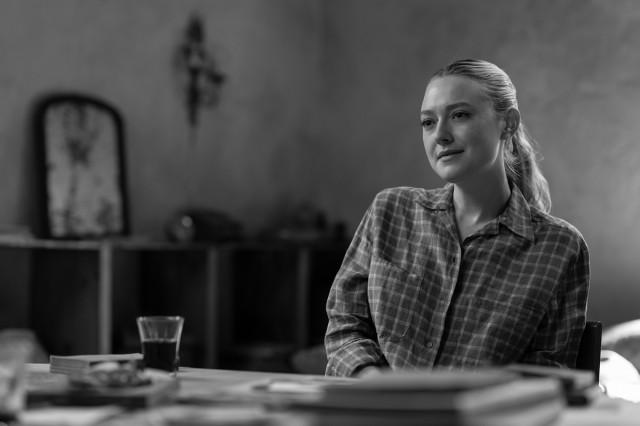
I said yes before it was even for sure. It was mentioned to me that Steve wanted to talk to me and wanted to send me the scripts and I was like, "I'll do it, I'll do anything." I'm a huge fan of Steve's work, a huge fan of Andrew and Johnny, and would have done anything to be a part of it. But then, of course, I read the scripts and read Steve's version of this story based on the novel and was so excited by the work that would be necessary to play this character and also to help support Andrew in such a brilliant performance. I was thrilled. And it was really the adventure of a lifetime.
Why do you think your character does not trust Tom Ripley from the very beginning?
Something that we learn about Marge is she's a small-town girl from Minnesota. She's probably from a very, very different background to Dickie Greenleaf is from. And, weirdly, Marge and Tom can see a little bit of each other in each other. And so, for lack of a better term, there's this Spidey sense that Marge has with Tom where something doesn't feel right. There's also that female intuition that sometimes you can spot things that not everyone can. I definitely believe in that. I think I have that a little bit. So, there's some of that. And I loved getting to be a character in the series that doesn't trust Tom and gets to play a little bit of a cat-and-mouse game with him and have these battles of wit between each other. I liked being a person in the series that isn't completely fooled by him. I get to throw it back at him sometimes in those scenes.
Talk about working with Andrew Scott.
Oh, I could talk about it all day. I really could. He's a lovely person, and so warm, loving, and funny. We had a very similar way of working and really developed a great bond where we could lean on each other. I am so in awe of his performance in this, and I love him as a friend. One of the best parts about being an actor is the little families that you create and the friends that you meet along the way that you can take with you throughout your whole life. And so, I feel lucky that Andrew's a person that I'll always know.
How was it working in Italy?
It was so wonderful. We were filming in so many different locations. I'd only been there for little, short periods of time. I got to spend a lot of time in each place and explore it to the fullest. It was difficult because you didn't really know whether you were on vacation or whether you were working. It was hard to separate the two. But I tried to do a little bit of the vacation part on my days off and get to eat all the food and walk around in the different cities and explore them. I tried to do it all to the fullest. But it's a beautiful place as is obvious.
Steve Zaillian (Creator, Writer, Director)
What attracted you to adapt Ripley into a television series, and what did you find the most exciting to translate and to put on screen?
I've been a fan of the book for a long time. Of course, I'd seen the other adaptations that have been done of the book, but I felt that to do it the way I wanted to do it, I needed more time, and the eight-episode format suited this book.
It allowed me to get into the details of the story, the details of the characters and the changing relationships between the characters in a way that you can't do in two hours. So that was the allure for me.
What was it that made you decide to shoot in black and white?
The book was written in 1955. It really is a kind of noir story, sort of the narrative version, or the novelistic version of film noir, and that means shooting in black and white.
And I felt that it would be distinctive in black and white because it wouldn't be like some sunny postcard of a story, which I don't think the book was. It was rather dark and foreboding, and I wanted to shoot in Italy in the wintertime to get this kind of shadowy film noir feel for Italy. And so black and white lent itself to that.
Marge's character functions as part of the chorus around Tom Ripley, but she provides a wonderful service to the audience, because she has the same feelings and reactions towards Tom as we do. So how do you strike the balance of her character so that she supports the lead, but also leads the audience?
That's a good question, and very observant too. Yes, Marge, in a way, I feel like the audience is Tom as well. I mean, that's one of the great things about the character and how Patricia Highsmith conceived him, as she somehow makes us not just understand what he's doing, but kind of complicit in it, in a way. But Marge is one of my very favorite characters, because she's on to him right away. The first moment she meets him, she knows something's not right, and then kind of goes back and forth with him.
She doesn't trust him. Then he plays to her vanity, and she thinks he might be okay. And then she becomes suspicious again, and it goes back and forth. And she is really, I think, the only character who has known him this long. Meaning she meets him in episode one and she's still dealing with him in episode eight, and she's the only character that does that. So, they have a lot to do with each other and their relationship keeps changing, and it's really fun to watch.
Many films and TV shows have tackled the mind and actions of both the sociopath and the psychopath. While none of us want to personally encounter one, what makes them such fascinating cinematic studies? Is there a balancing act in not making them empathetic as well?
I never really think about making a character empathetic or sympathetic. I try to just write who the character is.
But, you know, I've never felt that he was a psychopath. I know people sort of describe him as that sometimes, but he is certainly not a professional killer. He's not good at it. He does it in kind of a sloppy way that we might do it in. And I think that's another reason why we relate to him, is he's not that. He's no better at that sort of thing than we would be. And so, I just try to show what he does and sort of what he's thinking moment by moment.
And that's another reason why having the eight hours helps, because you can get into a scene that otherwise might just feel like a plot, and here it feels like a character.
The cat is such a good actor and scene sealer in the series. Could you please tell us about him or her? Name? Male or female? How did you find the cat? And how did you get such appropriate reactions from them for each scene?
The cat's name in the show is Lucio. Its real name is King. He is Italian, and he came from a cat person, and was not the first one to get cast. He was actually like maybe the third one to get cast. And he's a Maine coon cat, and he's just amazing.
And you think about how it's really difficult to get a cat to do what you want, but I think that King was a natural actor.
Were the first cats that were cast just not up to the job?
Yeah, they would wander around. They'd get up and walk off, or just not do what we wanted them to do, which was basically just sit and scrutinize what's going on. And basically, that's what he did. We would have people doing the things that Tom was doing, and he would just watch, you know? He was fabulous.
Maurizio Lombardi (Inspector Pietro Ravini)
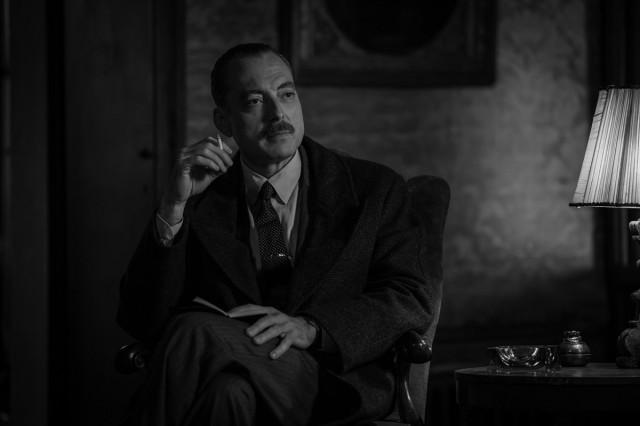
I think audiences will make a deeper trip inside the human being, because this novel is amazing, and the script by Steve is so accurate. Like our fear, maybe.
—MGP, GMA Integrated News



